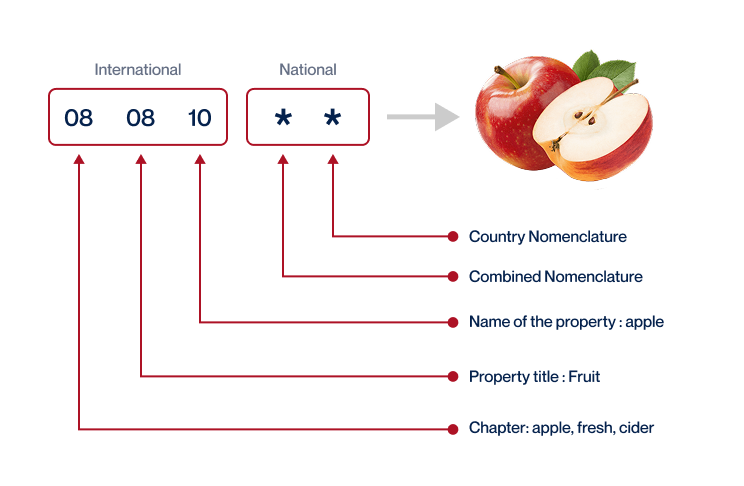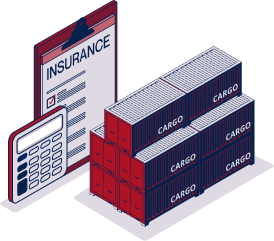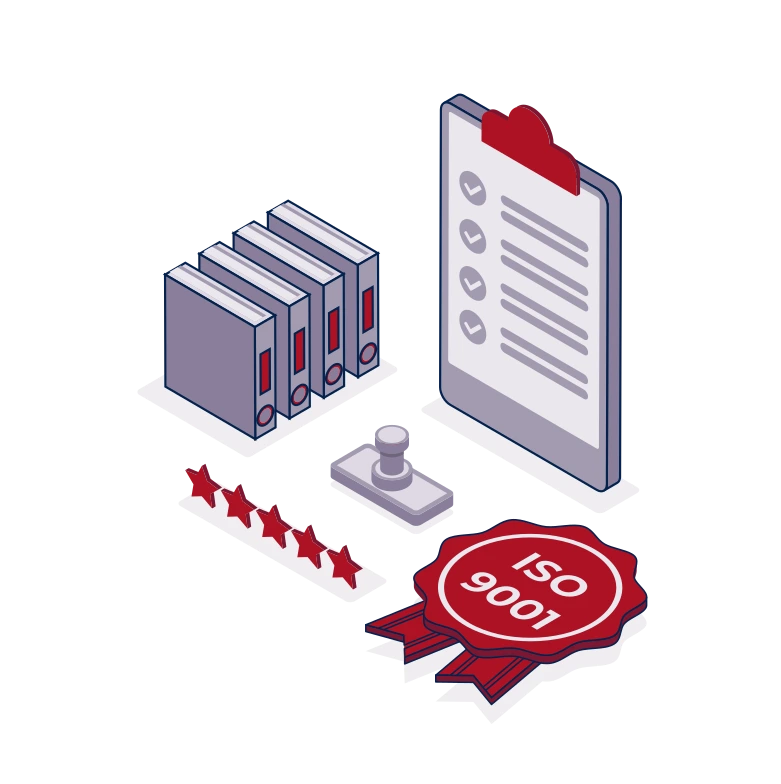Freight Shipping between UK and Cyprus | Rates – Transit times – Duties and Taxes
Ever tried to fit your freight into a bottle, so it can bob across the Mediterranean to Cyprus? There's an easier way! With freight transport between the UK and Cyprus, the potential for confusion is high - waves of rates, transit times and customs regulations can be a real headache. This guide seeks to help, breaking down each stage from selecting the perfect shipping option to understanding the nitty-gritty of customs procedures. We'll untangle the complexities of duties, taxes, and essential advice set within the unique requirements of businesses. If the process still feels overwhelming, let DocShipper handle it for you! Harnessing our experience and expertise as an international freight forwarder, we transform shipping challenges into triumphs, streamlining the journey from the UK to Cyprus for your goods.
Which are the different modes of transportation between UK and Cyprus?
Choosing the ideal transport method between the UK and Cyprus isn't just about tossing a coin. Factors of distance and border restrictions play key roles. However, the question isn't road or air? but rather sea or air? Strategically surrounded by the Mediterranean Sea and 3,000 miles away, Cyprus prefers the seagulls and anchors. Quick, small consignments might opt for an aerial view, while larger, less time-sensitive cargoes sail the sea way. Making the right choice can steer the wheel of your business's success. It's like picking the right vehicle for a family vacation - size and time matter, right?
Need help with your shipment?
Need assistance with your shipment? Dont hesitate to contact us even for a simple question. Choose the option that suits you
Live chat with an expert Chat on WhatsApp Free Quote 24hHow can DocShipper help you

Sea freight between UK and Cyprus
The United Kingdom and Cyprus share a fruitful maritime trade bond, connected seamlessly by busy cargo ports such as Limassol in Cyprus, and Felixstowe and Liverpool in the UK. This connection makes it possible to effectively import and export large quantities of goods via ocean freight. Though sea freight is not the fastest means of transport, it can easily handle high-volume consignments, making it a cost-efficient solution for shippers.
However, the process is not without its share of challenges. Many shippers, particularly those new to international trade, often find the intricate trade regulations and requirements daunting. From the labyrinth of customs documentation to understanding which shipments benefit from a certain type of sea freight, the learning curve can be steep. This guide will resolve such pain points, shedding light on the nuances of shipping between these two countries and revealing valuable best practices. By the end of this section, you’ll be better equipped to sidestep common pitfalls and streamline your shipping process. Let’s delve deeper into this underutilized, but extremely valuable trade route.
Main shipping ports in UK
Port of Felixstowe
Location and Volume: Located in Suffolk on the east coast of England, the Port of Felixstowe is the busiest container port in the UK. It has a shipping volume of roughly 4 million TEU annually.
Key Trading Partners and Strategic Importance: China, the USA, and Turkey are its top trading partners. Felixstowe plays a crucial role in UK trade, handling over 40% of the country’s container traffic.
Context for Businesses: If you’re looking to tap into European and Asian markets, Felixstowe’s vast network and high-frequency feeder services make it a practical choice. Its two deep-water terminals can also accommodate the largest vessels in the world.
Port of Southampton
Location and Volume: Situated on the south coast of England, the Port of Southampton primarily focuses on trade with the Far East. It has a shipping volume of about 2 million TEU.
Key Trading Partners and Strategic Importance: Its largest trading partners are Asia, North America, and Europe. The Port of Southampton is known for its expertise in handling automotive cargo, with 10 automotive manufacturers using it for imports or exports.
Context for Businesses: If you deal in the automotive industry, the Port of Southampton has specialized facilities for vehicle storage and transportation, handling over a million units a year.
Port of London
Location and Volume: Nestled along the River Thames, the Port of London is the second-largest in the UK, with a shipping volume of nearly 50 million tonnes.
Key Trading Partners and Strategic Importance: With over 80 operational terminals, the port primarily trades with Europe, in addition to North and South America. It significantly contributes to London’s economy and is the largest employer within the maritime sector.
Context for Businesses: Its multi-functional terminals can seamlessly handle a diversity of goods, from grab goods like scrap metal to high-value goods like wine, making it ideal for businesses with diverse operations.
Port of Liverpool
Location and Volume: The Port of Liverpool is located on the western coast of England and has a shipping volume of around 700,000 TEU.
Key Trading Partners and Strategic Importance: It trades mainly with North America, Asia, and Africa. The port is a hub for transatlantic trade, providing strong connections to the Americas.
Context for Businesses: If you have a strong trading interest in North America, the Port of Liverpool is a strong consideration due to its robust connections and extensive port-centric logistics capabilities.
Port of Grimsby
Location and Volume: Based on the east coast, the Port of Grimsby handles significant traffic, though largely dominated by automobiles.
Key Trading Partners and Strategic Importance: Grimsby’s primary trade is with Northern Europe, particularly in the automotive sector. Despite its specific focus, it is one of Europe’s leading car importers.
Context for Businesses: If you’re an automotive business with manufacturing or sales in Europe, the port’s ability to handle 500,000 vehicles annually plays to your advantage.
Port of Tyne
Location and Volume: On the banks of the River Tyne in northeastern England, this port handles about 600,000 TEU per year.
Key Trading Partners and Strategic Importance: Its main trading partners are from Europe and Asia. It plays a strategically important role as a vital import and export gateway for the northern part of the country.
Context for Businesses: Given its extensive storage capacity, purpose-built facilities, and excellent multimodal logistics connections, the Port of Tyne is positioned for businesses aiming for efficient northern UK distribution.
Main shipping ports in Cyprus
Limassol Port
Location and Volume: Located in the southern part of Cyprus, Limassol Port is the largest port in the country, processing more than 90% of the total TEU.
Key Trading Partners and Strategic Importance: Steadily gaining importance on the global maritime map, the port has strong links with key markets such as Europe, the Middle East, and North Africa. It also plays a strategic role as a hub in the eastern Mediterranean basin.
Context for Businesses: If you’re planning to reach the Greek, Turkish, and North African markets, Limassol Port is an attractive route due to its efficiency, modern facilities, and pivotal geographical location.
Larnaca Port
Location and Volume: Situated on the southeastern coast of Cyprus, Larnaca Port is the second largest port in Cyprus. Though smaller in volume compared to Limassol, it still plays a significant role in the country’s trade operations.
Key Trading Partners and Strategic Importance: Larnaca Port has its key trading partners in the European Union and the Middle Eastern regions. The port has been developed as a key destination for cruise liners, which also represents a potential sector for business to diversify into.
Context for Businesses: For businesses considering branching into cruise-line related services – catering, ship repair, or onshore tour operations – Larnaca Port presents interesting prospects. Its modern facilities and strategic location make it another significant link in your logistics chain.
Famagusta Port
Location and Volume: Famagusta Port is located in the eastern part of Cyprus. Historically significant, its volume has significantly decreased due to political factors.
Key Trading Partners and Strategic Importance: Earlier, Famagusta was an important port connecting Cyprus with other Middle Eastern and European countries. However, the current political situation has put a halt to its international trading activities.
Context for Businesses: Famagusta Port currently remains largely unused for trade due to the ongoing political situation. Businesses looking to navigate Cyprus’s trade routes would presently be better off focusing on Limassol and Larnaca Ports.
Should I choose FCL or LCL when shipping between UK and Cyprus?
Choosing between Full Container Load (FCL) and Less than Container Load (LCL), also known as consolidation, when shipping goods from the UK to Cyprus can be a strategic decision. Your selection can significantly impact your shipping cost, delivery time, and overall success. This section will delve into the perks and pitfalls of each option, arming you with the knowledge needed to make a savvy choice that serves your individual shipping needs best. Because when it comes to shipping, one size most definitely does not fit all! Let’s jump in.
Full container load (FCL)
Definition: 'FCL', or 'Full Container Load', refers to shipments that use an entire container, typically in 20'ft or 40'ft sizes. Unlike sharing space with others in LCL, or 'Less than Container Load', with FCL you have exclusive use of the whole container.
When to Use: FCL shipping becomes more cost-effective when transporting large quantities of goods. If your cargo totals more than 13/14/15 CBM, it's often cheaper to choose FCL. Moreover, the container remains sealed from the point of loading to the destination, ensuring better safety for your goods.
Example: Let's say you're shipping a bulk order of furniture from Birmingham to Limassol. Because of the size of your goods, filling a 20'ft FCL container entirely would be your best option. This way, your items stay protected, reducing the risk of damage during transit.
Cost Implications: While the initial FCL shipping quote may seem high, remember that the cost per unit decreases with the volume of goods. So, despite an FCL container seeming more expensive than LCL, for larger shipments, it’s the most economical and secure option for your UK to Cyprus route.
Less container load (LCL)
Definition: LCL (Less Than Container Load) shipping is a mode of sea freight for small quantities of goods. It refers to a consignment shipped in a container shared with other goods from different shippers, hence 'consolidation.'
When to Use: LCL shipping is most suitable when your cargo is less than around 13-15 CBM (Cubic Meters). It offers cost-effective and flexible options for low volume shipments.
Example: Let's assume you're a furniture manufacturer in the UK, needing to send ten individual pieces to retailers in Cyprus. The volume of your package is less than a full container, so you could opt for LCL shipment. Here, your goods will share the journey with other products in a consolidated container, leaving room for goods from other businesses, ensuring an economical use of space.
Cost Implications: As LCL freight charges are based on the volume of the shipment, you only pay for the space your goods occupy within the shared container, which can be significantly cheaper than a full container load. However, expect some additional costs such as customs clearance and local charges when your consignment reaches Cyprus. Be aware that these costs vary and may affect your overall shipping expenses.
Hassle-free shipping
Trust DocShipper, your dedicated freight forwarder, to make shipping between the UK and Cyprus straightforward and hassle-free. Our ocean freight specialists utilize expertise to evaluate factors such as your cargo's volume, nature, and urgency to help you choose between consolidation or a full container. Simplify your logistics puzzle with us today, one shipment at a time. Contact us for a free estimation and let's charter the best route for your cargo together.
On average, the journey from the UK to Cyprus via sea freight can range widely, taking anywhere between 10 to 30 days. Keep in mind, these numbers can fluctuate due to numerous factors. The transit time heavily depends on the specific departure and arrival ports that are used, along with the nature and the weight of the goods being shipped. For a highly tailored quote that perfectly aligns to your unique needs and situation, it’s recommended to contact a trusted freight forwarder, such as DocShipper.
Here’s an illustrative table computing average transit times. It’s important to note that these figures are approximate and will accurately be provided once a detailed quote is sought after.
| UK Ports | Cyprus Ports | Average Transit Time (Days) |
| Felixstowe | Limassol | 25 |
| Southampton | Larnaca | 28 |
| Hull | Vassilikos | 25 |
| Liverpool | Famagusta | 29 |
*Since Cyprus only has 4 significant commercial sea ports, they are all included in this table. The choice of port can heavily influence transit times and costs.
How much does it cost to ship a container between UK and Cyprus?
Transporting a container between the UK and Cyprus can range significantly in cost per CBM. Ocean freight rates and shipping costs fluctuate based on numerous variables such as the Point of Loading, Point of Destination, the specific carrier selected, the type of goods shipped, and the monthly market state. With such a dynamic landscape, providing an exact quote is a complex task. Yet, there’s no need to fret! Our shipping specialists are committed to working closely with you, pulling from a wealth of experience to secure the best rates tailored to your unique shipping requirements. We value a transparent, case-by-case approach to quoting, giving you assurance amidst uncertainty.
Special transportation services
Out of Gauge (OOG) Container
Definition: Out of Gauge Cargo refers to any shipment that exceeds standard shipping container dimensions (length, width, or height). If your item doesn’t fit into a standard shipping container, you’ll require an OOG container to ship between the UK and Cyprus.
Suitable for: Large machinery, oversized vehicles, industrial equipment, or any bulk goods that can’t fit into standard containers.
Examples: Large construction equipment, wind turbine blades, or yachts.
Why it might be the best choice for you: If your goods are too big for regular containers, sending them as Out of Gauge cargo is the way to go. Rest assured, your oversized items will be secure and protected during their sea journey.
Break Bulk
Definition: Break bulk is a shipping method where goods are loaded individually, not in containers. The term originates from the phrase breaking bulk which means the extraction of a portion of the cargo on a ship or the beginning of the unloading process from the ship’s holds.
Suitable for: Loose cargo loads, forestry products, steel girders, and any goods that don’t easily fit in a standard container due to their shape or size.
Examples: Packed materials like sacks, drums, or big bags, machinery, or parts of windmills.
Why it might be the best choice for you: Choosing break bulk can provide the flexibility you need for oddly shaped items, ensuring the safe and secure transport of your goods from the UK to Cyprus.
Dry Bulk
Definition: Dry bulk involves shipping of unpackaged bulk goods such as grains, coal, cement, or minerals in large quantities in vessels designed for this particular task.
Suitable for: Raw, unpackaged materials and loose goods.
Examples: Grain, iron ore, coal, or gravel.
Why it might be the best choice for you: Dry bulk shipping is efficient and economical for shipping large volumes of unpackaged raw materials. If your business deals in such goods, this could be the most cost-effective option for you.
Roll-on/Roll-off (Ro-Ro)
Definition: A roll-on/roll-off (ro-ro) vessel is designed to carry wheeled cargo, such as cars, trucks, semi-trailer trucks, trailers or railroad cars, which are driven on and off the ship on their own wheels or by using a platform vehicle.
Suitable for: Vehicles and any other cargo that can be wheeled onto the ship.
Examples: Cars, trucks, trailers, buses, or excavators.
Why it might be the most suitable choice for you: If you’re shipping vehicles or heavy machinery from the UK to Cyprus, using a Ro-Ro vessel is your best bet. It’s a safe, efficient, and economical method ensuring your cargo arrives ready to roll.
Reefer Containers
Definition: Reefer containers are refrigerated containers designed to carry perishable goods that need to maintain a certain temperature during transit.
Suitable for: Fresh or frozen produce, pharmaceuticals, plants, or other perishable items.
Examples: Fruit, vegetables, meat, seafood, or medication.
Why this might be the best choice for your business: If your cargo needs to stay cool or be frozen on its journey between the UK and Cyprus, using a reefer container is the way to go. It guarantees your items stay fresh during their long sea journey.
At DocShipper, we understand every business is unique and so are your shipping requirements. Contact us today for a free shipping quote and we’ll respond in less than 24 hours. Let us handle your shipping needs, tapping into our wealth of knowledge and experience in freight forwarding.
Air freight between UK and Cyprus
Speedy, reliable, and ideal for smaller parcels with a higher price tag, air freight serves as a trusty steed in the trade between the UK and Cyprus. Picture air freight like an express delivery – perfect for shipping electronics, pharmaceuticals, and even fashion items that need to reach their destination on the double.
However, quick transport often comes with bumps on the road. Many shippers tend to trip over their shoelaces when it comes to air freight. Picture this: you’re shipping a big box of iPads but calculated the costs based on their actual weight. Big mistake. Air freight charges are often decided by volumetric weight, which can be more than the actual weight if your products are light but huge. Also, there are many other hidden corners like missing out on best practices that, unbeknownst to you, may drain your pocket faster than a leaky faucet. We’ll delve into these common errors and more, showing you how to keep more money in your bank account while your packages take flight.
Air Cargo vs Express Air Freight: How should I ship?
Deciding to ship your goods from the UK to Cyprus? Let’s take the perplexity out! Consider this: air cargo is like catching a commercial flight with your goods snuggly stored in the hold of an airline. But express air freight? It’s like chartering your very own plane, guaranteeing a speedy, dedicated service for your precious cargo. Time to compare and see what works best for your business!
Should I choose Air Cargo between UK and Cyprus?
If you’re shipping between the UK and Cyprus, Air cargo can be a reliable choice. Prominent airlines like British Airways, and Cyprus Airways, reinforce this with their consistent schedules and trustworthy service. This method proves cost-effective especially when dealing with cargo around 100/150 kg (220/330 lbs). Although transit times might be slightly longer due to fixed schedules, the combination of reliability and competitive pricing makes air freight an attractive option for your business transport needs. Bear in mind, your budget and timeline should guide your choice.

Should I choose Express Air Freight between UK and Cyprus?
Selecting Express Air Freight can be a smart choice if you’re shipping relatively small cargo, typically under 1 CBM or 100/150 kg (220/330 lbs), from the UK to Cyprus. As a specialized service, it utilizes dedicated cargo planes, with no passengers, ensuring quicker transit times. Established courier firms like FedEx , UPS , and DHL offer this service, providing door-to-door delivery and online tracking options. Turnaround times are greatly reduced, making this an ideal option if your shipment is urgent or time-sensitive. Thus, if speed is a vital aspect of your logistic needs, Express Air Freight might just tick all the boxes.

Main international airports in UK
Heathrow Airport
Cargo Volume: Heathrow is one of the busiest airports in the UK, handling around 1.7 million tonnes of cargo annually.
Key Trading Partners: Heathrow’s key trading partners include the US, Germany, China, Hong Kong, and India.
Strategic Importance: Its location on the outskirts of London provides easy access to the largest market of the UK. Heathrow is a vital hub for the UK’s import-export industry, with around 65% of the country’s air cargo market running through this airport.
Notable Features: Heathrow offers extensive cargo handling facilities and services, including express and high-priority cargo handling,
secured cargo areas, and advanced handling capabilities for perishable and dangerous goods.
For Your Business: If you’re looking to reach international markets quickly – particularly North America and Asia – utilising Heathrow’s extensive route network and cargo handling capabilities could offer significant benefits.
London Gatwick Airport
Cargo Volume: Gatwick handles over 100,000 tonnes of cargo annually.
Key Trading Partners: Gatwick’s top trading partners by value are the US, UAE, and EU countries.
Strategic Importance: Located near the capital, Gatwick serves as the second largest airport and offers an alternative shipping route to and from the UK.
Notable Features: Gatwick provides a wide range of cargo handling services. It has dedicated cargo facilities for express courier and postal traffic, as well as for freighter aircraft.
For Your Business: If you’re trading with the EU, UAE, or US and want an alternative to Heathrow, Gatwick may be a reliable option. Their freight services are swift and efficient, potentially helping to streamline your shipping process.
East Midlands Airport
Cargo Volume: East Midlands Airport is the UK’s busiest pure freight airport, handling over 320,000 tonnes of shipped goods per year.
Key Trading Partners: Key trade links include EU countries, the US, UAE, and Asia.
Strategic Importance: Situated in the heart of Britain, East Midlands Airport is a key link that connects businesses to both national and international markets, and can be a strategic choice for businesses located in Central UK.
Notable Features: The airport has a dedicated cargo village, express courier integration centers, and specialist handlers for dangerous goods.
For Your Business: If your business operates late-night or time-sensitive deliveries, East Midlands Airport operates 24/7 with dedicated express courier services. This could help you meet demanding delivery schedules.
Stansted Airport
Cargo Volume: Stansted handles over 200,000 tonnes of air cargo every year.
Key Trading Partners: The Airport’s main trading partners are the US, UAE, Turkey, Hong Kong, and China.
Strategic Importance: Located just outside of London, Stansted provides a crucial transportation hub for the south of England.
Notable Features: Stansted boasts a dedicated Cargo Terminal and 24/7 operation, giving it the ability to handle all types of cargo.
For Your Business: If you often ship high-value or urgent goods, Stansted’s 24/7 operation and dedicated cargo terminal might be just what your business needs.
Manchester Airport
Cargo Volume: Manchester Airport accommodates over 120,000 tonnes of import and export freight and mail annually.
Key Trading Partners: Key trading regions include America, Asia, and the Middle East.
Strategic Importance: Manchester Airport connects the north of England with over 160 destinations worldwide and provides valuable opportunities for businesses located in the North.
Notable Features: It has dedicated facilities for handling large and heavy freight, plus specialist facilities for dangerous goods.
For Your Business: If your business is located in the north of England, Manchester’s comprehensive global route network could help you expand your international reach, while their cargo handling facilities can safely and efficiently process a wide range of goods.
Main international airports in Cyprus
Larnaca International Airport
Cargo Volume: Approximately 38,000 tonnes of cargo annually
Key Trading Partners: Countries like UK, Germany, Israel, and Greece, among others.
Strategic Importance: Located on the southern coast of Cyprus, ideal for flights connecting Europe, Africa, and Asia.
Notable Features: Equipped with modern cold storage facilities suitable for perishable goods and pharmaceuticals.
For Your Business: If your goods target markets in Europe, Africa or Asia, consider using Larnaca due to its geographically strategic location and sophisticated storage facilities.
Paphos International Airport
Cargo Volume: Handles a smaller volume compared to Larnaca. Not a main hub for cargo, instead serves mainly passenger airlines, but still maintains necessary facilities for cargo.
Key Trading Partners: Shares similar key trading partners to Larnaca, with an emphasis on European nations.
Strategic Importance: Though mostly passenger-orientated, benefits include its location near Paphos city, lower congestion, and proximity to western-based businesses.
Notable Features: Less crowded compared to Larnaca and open around the clock, which can expedite processing times.
For Your Business: If you are shipping less frequently and want swift processes, Paphos may offer less wait time and quick operations.
How long does air freight take between UK and Cyprus?
Typically, air freight shipping between the UK and Cyprus can take between 1-3 days. However, it’s important to note that actual transit time can vary. Various factors play into this, including the specific airports, the weight of the shipment, and the nature of your goods. For accurate timelines, it’s best to consult with a professional freight forwarder like DocShipper.
How much does it cost to ship a parcel between UK and Cyprus with air freight?
Air freight costs between the UK and Cyprus average at about €5-€8 per kg. However, an ‘exact’ rate is tough to pin down – factors such as airport distance, parcel dimensions and weight, plus the nature of the goods all come into play. But don’t worry – we’re here to get you the best value. We quote on a case-by-case basis, ensuring the finest fit for your unique needs. Want the specifics? Contact us and receive a free quote in less than 24 hours!
What is the difference between volumetric and gross weight?
Gross weight refers to the actual physical weight of your shipment, fully packed, and ready for transport. Volumetric weight, on the other hand, represents the ‘space’ your package occupies in the aircraft, which may not always be proportionate to its actual weight.
Calculations in air cargo use these formulas: Gross weight is simply the weight of your cargo on a scale, which is straightforward. Volumetric weight, however, is determined by multiplying the package’s length, width, and height (in cm) and then dividing the product by 6000. Let’s imagine a crate with dimensions 100 cm x 100 cm x 100 cm that weighs 180 kg. Its volumetric weight thus becomes (100x100x100)/6000, equaling 166.67 kg. Converting this to lbs, it’s approximately 367 pounds.
For Express Air Freight, the divisor is typically smaller; commonly 5000. So, the volumetric weight in our above example would be (100x100x100)/5000, giving us a volumetric weight of 200 kg or about 440 lbs.
These calculations are crucial as freight charges are based on the higher of the two weights – gross or volumetric. This method ensures fair fees for airlines, considering both the weight and space taken by shipments.

Door to door between UK and Cyprus
Door to Door shipping is your one-stop international shipping solution, handling everything from packing goods in the UK to their delivery in Cyprus. This hassle-free method takes the stress off your shoulders, ensuring a smooth transit for your freight. With efficiency as its hallmark, it’s a sought-after choice for many. So let’s dive in and unpack the benefits of this shipping route.
Overview – Door to Door
Shipping goods between UK and Cyprus? Consider door to door shipping – a hassle-free solution widely preferred by our clients. This approach simplifies complex processes, removing stress from dealing with various transport modes, customs clearance hurdles, or tracking concerns. Embrace the convenience of having your shipment picked up and delivered right at the doorstep, eliminating extra handling. But take note, costs might be slightly higher due to the inclusive service. In essence, door to door shipping provides you a strategic edge, offering simplicity, efficiency, and peace of mind in the intricate world of international freight shipping.
Why should I use a Door to Door service between UK and Cyprus?
Who doesn’t want a stress-free shipping solution? When shipping from the UK to Cyprus, Door to Door service is that antidote to logistics headaches. Here are five compelling reasons why it delivers, quite literally!
1. Zero Hassle: Forget the days of arranging multiple carriers or coordinating between various logistics service providers. Door to Door service picks up your goods right from your doorstep, handles everything in between, and delivers directly to your final destination. Quite the convenience, isn’t it?
2. Timely delivery: In business, every second counts. Especially when it’s about urgent shipments. Under this service, your goods stay in the hands of a single provider, cutting down on delays usually caused by unnecessary handling or transfers. It simply means your goods chug along swiftly and punctually.
3. Highly Specialized Care: Have a complex cargo on board? Door to Door service has your back. It is equipped to manage seemingly confusing freights, whether it’s dealing with specific temperature control measures or dealing with fragile items. Consider it as a personal assistant for your cargo.
4. Exemplary Tracking: From shipment to receipt, keep track of your cargo at every step. You can check in anytime, ensuring peace of mind and enabling you to be hands-on, without the heavy lifting.
5. All-Inclusive Service: Lastly, the icing on the cake is the comprehensive nature of Door to Door service. It handles everything from customs clearance to paying duties and managing paperwork – Managed, convenient, and complete.
So, for a service that relieves your logistics stress and delivers value at every step, Door to Door service is here to turn shipping nightmares into a walk in the park!
DocShipper – Door to Door specialist between UK and Cyprus
Streamline your UK to Cyprus shipping with DocShipper’s comprehensive door-to-door service. Our skilled team expertly handles packing, transport, customs clearance, and all shipping methods, ensuring a smooth, stress-free experience. An assigned Account Executive will navigate you through every step. Reach out for a free, no-obligation estimate within 24 hours, or speak directly to our knowledgeable consultants. Your shipping journey, simplified with DocShipper.
Customs clearance in Cyprus for goods imported from UK
Customs clearance is the vital procedure of getting your goods through customs control when importing into Cyprus from the UK. It can be a labyrinth of fees, taxes, and tariff rates, where unexpected charges lurk, and goods can be held up. Understanding duties, taxes, license requirements and quotas are key factors to ensure your shipment isn’t delayed. With the right guidance, you can sidestep common pitfalls. Fear not, we’ll walk you through all these aspects in the sections ahead. DocShipper is your go-to source to navigate the complexities, ready to assist with shipments of any goods, globally. To kick-start the process, reach out to our team armed with the origin and value of your goods, plus the HS code. These are vital for an estimate, helping you budget aptly for your project.
How to calculate duties & taxes when importing from UK to Cyprus?
Understanding the process to estimate duties and taxes for importing goods from the UK to Cyprus can seem overwhelming, but we’re here to help break it down for you. It’s crucial to note that the computation of customs duties requires an understanding of various key factors. These include the country of origin, the HS (Harmonized System) Code, the customs value of the goods, the applicable tariff rate, and any additional taxes and fees that may be levied on the products.
The first step in this taxing journey — pardon the pun — is to pinpoint the country where the goods were actually manufactured or produced. This is not always the same as the country from where you are importing, so you’ll want to double-check before diving further into the calculation process.
Step 1 – Identify the Country of Origin
First, pinpointing the country of origin is crucial. Why? Here’s why:
1. It ascertains the product’s compliance with the destination country’s safety, health, and technical requirements.
2. It verifies the rules of origin to determine if it qualifies for lowered or zero tariffs under any trade deals.
3. The exact country of origin helps keep the imports legal, meeting both international business ethics and Cyprus’s import laws.
4. Knowing exactly where your item comes from ensures it’s not subject to any import restrictions or prohibitions.
5. Lastly, it provides valuable info for Cyprus customs to calculate the necessary duties, taxes, and fees.
Now, let’s examine UK-Cyprus ties. Ever since Brexit, the UK-Cyprus trade relationship exists under the UK-EU trade agreement, meaning certain goods may receive preferential tariffs. Be sure to use the preferential tariff rates when they apply to your goods.
Remember, every item has its import restrictions. For example, motor vehicles older than five years cannot enter Cyprus from the UK. Stay ahead and familiarize yourself with the commodity-specific restrictions for smooth business shipping. Happy importing!
Step 2 – Find the HS Code of your product
A Harmonized System Code, or HS Code, is a standardized system of names and numbers to classify traded products. This internationally used code allows countries to track and regulate commodities crossing their borders. The HS Code is crucial in determining import duties, taxes, and eligibility for trade agreements.
Your supplier can usually provide you with the HS Code, as they should be familiar with the products they’re exporting and the relevant customs regulations.
However, if obtaining the code from your supplier isn’t feasible, there’s an easy way to find it yourself. Follow these simple steps:
1. Go to the Harmonized Tariff Schedule.
2. Input the name of your product in the search bar.
3. Look for the HS Code in the ‘Heading/Subheading’ column.
A word of caution: accuracy in selecting the HS Code is vital. An incorrect code could lead to shipment delays, costing your business time and money in potential fines.
Here’s an infographic showing you how to read an HS code.

Step 3 – Calculate the Customs Value
Understanding customs valuation can be tricky, especially when you’re importing goods from the UK to Cyprus. It’s not simply the price tag value of your products. The customs value takes into account three key elements: the price of goods, international shipping costs, and insurance costs.
Imagine you’re shipping a batch of designer clothes worth $10,000. Your shipping cost is $1,000, and insurance is another $200. So, your CIF value, which becomes your customs value, is $10,000 (price of clothes) + $1,000 (shipping) + $200 (insurance) = $11,200.
This sum, not just the product price, is used to calculate the customs duties and taxes. It’s crucial to grasp this concept because it directly impacts your bottom line. Mistakes here can lead to overpayment, or worse, customs issues and delays. So, always be precise, folks!
Step 4 – Figure out the applicable Import Tariff
An import tariff is essentially a tax imposed on goods brought into a country. The UK uses a different system from the EU, and your tariff can be found by using the UK’s trade tariff tool.
Here’s how you can identify your import tariff:
– Visit the UK Trade Tariff tool
– Enter the HS code for your goods – this was identified in a previous step.
– Confirm the country of origin.
This tool will state the different duties and taxes levied on your goods when they enter Cyprus from the UK.
As an example, let’s say your HS code is 6109.10 (T-shirts made of cotton), originating from the UK. The tariff rate might show up as 12%. If your cost, insurance, and freight (CIF) is $10,000, your import duty will be 12% of this CIF value, thus $1,200.
Please note, these numbers are simplified for illustration purposes and actual calculations will involve more complexity. It is always a good idea to seek expert advice for your specific shipment needs.
Step 5 – Consider other Import Duties and Taxes
In addition to standard tariff rates, other import duties may apply when you’re shipping goods from the UK to Cyprus. Depending on the type of product and its origin country, you might encounter fees like excise duty, which typically applies to goods like alcohol, tobacco, or energy products. Similarly, anti-dumping taxes might come into play if your goods are sold at a substantially lower price than their usual market value.
However, the tax to really keep a watchful eye on is Value Added Tax (VAT). This tax generally has the most significant percentage, and it’s the one that varies most frequently. For illustrative purposes, let’s imagine you’re importing furniture with a value of $5,000. Consider a made-up VAT rate of 19%: that’s an additional $950 you didn’t foresee. Always remember that rates and duties can vary, so the figures mentioned are hypothetical.
This stage in the process can be complex. We recommend partnering with professionals experienced in international customs procedures to mitigate unexpected costs. Your focus should be on enabling a smooth flow for your imported goods while keeping an accurate tab of your financial responsibilities. By doing so, you can avoid any unexpected hitches when importing your goods into Cyprus.
Step 6 – Calculate the Customs Duties
Calculating customs duties can feel like a daunting task but it is essential when importing goods from the UK to Cyprus. The calculation depends on three key factors: the customs value of the goods, Value Added Tax (VAT), and potentially, anti-dumping taxes and Excise Duty.
To illustrate, here are three examples:
1. Imagine your shipment has a customs value of $2000 with no VAT. If the customs duty is 5%, your total fee will amount to $100 (5% of $2000).
2. Now consider a shipment worth $4000 with a VAT at 20% and customs duty of 5%. Your duty becomes $200 (5% of $4000) and VAT is $840 (20% of ($4000 + $200)).
3. Lastly, picture a shipment valued at $6000, with a VAT at 20%, a customs duty of 5%, and both anti-dumping taxes, and Excise Duty, each at 10%. Your customs duty equals $300 (5% of $6000). The VAT equals $1260 (20% of ($6000 + $300)). The combined impact of anti-dumping taxes and Excise Duty will further raise your total costs.
Understanding these elements is crucial, but staying updated on changing tax values and tariffs is just as important. At DocShipper, we ensure your customs clearance is handled seamlessly, ensuring you’re never overbilled. Wherever you’re shipping in the world, our team can support in less than 24 hours. Reach out to us for a free quote today.
Does DocShipper charge customs fees?
At DocShipper, we act as your customs broker in the UK and Cyprus, but we don’t charge customs duties. We help streamline the clearance process and our fees cover this service. The charges from the government for duties and taxes are separate. These payments go directly to the government – we’ll give you all the necessary documents to ensure you’re only paying the exact customs charges. This way, you can stay clear of any unexpected fees, making international shipping less daunting.
Contact Details for Customs Authorities
UK Customs
Official name: Her Majesty’s Revenue and Customs (HMRC)
Official website: https://www.gov.uk/government/
Cyprus Customs
Official name: Customs and Excise Department of the Republic of Cyprus
Official website: http://www.mof.gov.cy/
Required documents for customs clearance
Understanding the paperwork for customs clearance can feel like decoding a secret language. This section will lift the fog on the Bill of Lading, Packing List, Certificate of Origin, and the Documents of conformity (CE standard) that often baffle many businesses. Prepare to unravel these mysteries to ace your next international shipment!
Bill of Lading
Navigating the shipping waters between the UK and Cyprus? Then, the ‘Bill of Lading’ is your lifeline. Acting as your proof of ownership, this document details what’s in your shipment and helps guarantee a smooth customs clearance. In the digital age, a ‘telex release’ means you can swiftly transfer these documents, reducing barriers and speeding up your goods’ journey. It’s a game-changer. And if your cargo is hitting the skies? Don’t forget your AWB (Air Waybill), the air equivalent to the Bill of Lading. So, for a stress-free shipping experience, ensure your Bill of Lading or AWB is correctly documented and easily accessible to clear customs without a hitch. Remember, smoother paperwork means smoother shipping!
Packing List
Navigating the sea of customs between the UK and Cyprus? Your Packing List, though seemingly mundane, is your lifeline. Like your shipping manifest, your Packing List serves as the inventory of your shipment – detailing product types, quantities, weights, and more. Accuracy is key here. In a world of ‘no surprises’ at customs, correctly filled out Packing Lists are as valuable as the goods you’re ferrying. Shipping car parts or artisanal cheese? Your Packing List should avoid any ambiguity in the slightest. Got a shipment of 100 car mufflers? Detail them all. Ten wheels of Halloumi? Double-check and declare each. Whether it’s sea or air freight, your Packing List cuts through the red tape, easing your goods through UK and Cyprus customs. So next time you’re preparing your shipment, remember – your Packing List is not just a list, it’s your cargo’s passport for a swift journey through customs.
Commercial Invoice
The commercial invoice is your magic key in the world of UK-Cyprus shipping. Think of it as a detailed list of your goods, highlighting essential data like product descriptions, prices, HS codes, and country of origin. For a smooth customs clearance, align this with your packing list and bill of lading. For instance, if your invoice lists 10 units of Product A, your other documents should reflect the same. Be aware! Inconsistent info can lead to delays. Pro tip: Include the ‘reason for export’—it can be as straightforward as ‘sale of goods’. This helps customs officials understand the transaction, aiding a faster clearance process. Congrats, your commercial invoice is now an ace in your shipping deck!
Certificate of Origin
Embarking on a shipping journey from the UK to Cyprus? The Certificate of Origin (CoO) is your best mate. Essentially, it’s a declaration of where your goods are produced. This seemingly small detail can unlock big advantages like preferential customs duty rates, making it a money-saver for exporters. For instance, if you’re shipping UK-manufactured car parts, a correctly filled CoO can slash those duty rates, increasing your profit margins. So, don’t forget to indicate all particulars correctly. The CoO might just be the ace up your business sleeve, transforming complexities into opportunities in your shipping adventure.
Get Started with DocShipper
Prohibited and Restricted items when importing into Cyprus
Knowing what can’t fly in your cargo to Cyprus can be a blatant hassle. Here, we delve into those finicky restrictions and outright prohibitions that could halt your shipment dead in its tracks. Let’s find out more to avoid any costly hindrances.
Are there any trade agreements between UK and Cyprus
Indeed, the UK and Cyprus have a trade relationship strengthened by the UK-Cyprus Trade Agreement, in force since January 2021. This deal aids seamless shipping of goods, eliminating tariffs on various items. The agreement aligns with the EU’s previous arrangement with Cyprus, offering familiarity and continuity. Ongoing discussions within the Cyprus-UK Business Association further hint at future prospects. Keep abreast with these trade developments to seize potential opportunities.
UK – Cyprus trade and economic relationship
The UK-Cyprus relationship dates back to the British colonial era, paving the road for a long-standing trade and economic partnership. Significant milestones in this relationship include Cyprus’ entry into the EU in 2004, opening the gateway to fluid trade, with no tariffs or quotas.
The key sectors driving trade are food, drink, pharmaceuticals, and machinery, characteristic of Cyprus’ mixed, high-income economy and the UK’s robust industrial marketplace. The UK is among Cyprus’ top trade partners, with an investment stock valued at €1.44 billion in 2020, a testament to their economic synergy.
In terms of trade volume, 2022 witnessed over €1.8 billion worth of goods between the two nations. UK exports to Cyprus stood at approximately €503 million, while Cyprus’ exports to the UK reached nearly €1.1 billion. This dynamic partnership continues to offer growth opportunities for businesses seeking to bridge connections between these markets.
Your first steps with DocShipper
Additional logistics services
Warehousing
Finding the right warehousing solution can be tricky, especially for goods needing temperature control. Think fine wines or specialty foods – without the proper conditions, your business could suffer. Don't fret! We've got you covered with stellar services grappling these complexities. Invest in your peace of mind today.
Packing
Guarding your goods with top-tier packing and repacking is essential for UK-Cyprus shipments. The right agent goes beyond bubble-wrap, tailoring protection to your products - perhaps crating archeological artifacts or vacuum-sealing Cypriot Halloumi. No challenge is too unique. It's about delivering your wares as pristine as they started, no matter the journey.

Transport Insurance
In the complex world of freight, Cargo Insurance is a lifeline - think of it as your safety net. Unlike fire insurance that solely covers damage from flames, this covers everything from theft, damage in transit, even natural disasters. To illustrate, imagine your shipment encounters a storm at sea - quite the headache, right? Cargo Insurance eases this pain by shielding you from financial risks.

Household goods shipping
Relocating from the UK to Cyprus with treasured items? Our Personal Effects Shipping service ensures safe handling of your precious yet bulky objects. Ever shipped a grand piano? We manage with ease and flexibility.
Procurement in Thailand
Expanding your business between the UK and Cyprus? DocShipper is here to ease sourcing and fabrication from Asia, East Europe, and more. Imagine, you have your own procurement team bridging language gaps, pinpointing suppliers and overseeing the entire procurement process. It's as simple as shipping a package from London to Limassol! Thrive with our help.

Quality Control
Your shipment from the UK to Cyprus deserves nothing less than top-notch quality. That's where our Quality Control steps in, ensuring your goods meet all relevant standards during manufacturing or customization. Remember the water filter company that avoided a hefty recall after our inspection caught a design flaw? That's peace of mind for you.

Conformité des produits aux normes
Shipping goods globally? Ensuring your delivery meets specific destination regulations is a must. Our Product Compliance Services can ease this process for you. We'll conduct thorough lab tests to certify your product's regulation compliance, saving you any unwanted surprises. Curious about how we can help?


